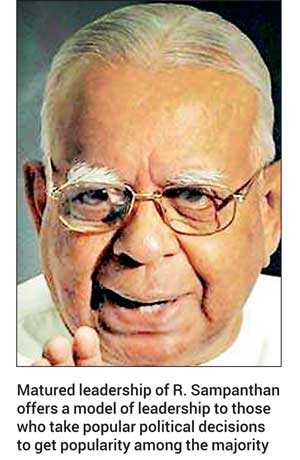Monday Feb 16, 2026
Monday Feb 16, 2026
Tuesday, 12 May 2020 00:00 - - {{hitsCtrl.values.hits}}
In a democracy, arrogance should not be met with arrogance but with patience. Recently the Tamil National Alliance (TNA) met arrogance with patience and they are being criticised for that.
TNA participated in a meeting convened by the Prime Minister at Temple Trees of the parliamentarians of the last parliament. Ajith Perera and Sujeewa Senasinghe, former parliamentarians of Samagi Jana Balavegaya (SJB) came in a private television channel recently and accused the TNA of having a deal with the Government. A candidate of the Janatha Vimukthi Peramuna (JVP) of the forthcoming general election also expressed same sentiments. Members of the SJB have already forgotten that their leader got almost all the Tamil votes at the last presidential election due to the intervention of the TNA.
Throughout our history after the independence, political parties in the north did not effectively contribute to the politics of the centre.
There were two independent Tamil ministers in the first parliament of Sri Lanka. Later G.G. Ponnambalam, the leader of the All Ceylon Tamil Congress joined the Government as a minister. The second parliament had one independent Tamil minister and two Tamil ministers of the United National Party (UNP). In addition to them G.G. Ponnambalam also was in the cabinet. Under the Premiership of John Kotelawala there were two Tamil ministers in the cabinet, one was from the UNP and the other came from the Senate.
There were no Tamil ministers in the cabinets of S.W.R.D. Bandaranaike in 1956, of Dudley Senanayake in March 1960, and of Sirima Bandaranaike in July 1960. In 1965 Dudley Senanayake Government came into an agreement with the Federal Party to give a solution to the national problem. Accordingly, M. Tiruchelvam became a minister of that Government. However, Tiruchevam and the Federal Party moved away from the Government in 1968 since the agreement was failed.
C. Kumarasurior was a cabinet minister of the Sirima Bandaranaike Government in 1970. In the Governments of J.R. Jayewardene, K.W. Devanayagam and C. Rajadurai of the UNP were cabinet ministers. In addition to them S. Thondaman of the Ceylon Workers Congress (CWC) was also a minister. Thondaman was the only Tamil minister of the governments of R. Premadasa and D.B. Wijetunga. In addition to him, Lakshman Kadirgamar was also in the cabinet of Chandrika Kumaratunga.
Thereafter the Tamil ministers of Sri Lankan governments were from the CWC, the National Union of Workers, the Upcountry Peoples Front (political parties of the plantations), the Democratic People’s Front (Mano Ganesan), the Eelam People’s Democratic Party (Douglas Devananda) and the UNP.
Therefore the main political parties in the north were represented in Sri Lankan cabinets only by G.G. Ponnambalam and M. Tiruchelvam. Additionally, A. Amirthalingam was the leader of opposition in 1977 and R. Sampanthan was the leader of opposition in 2015.
Initial stages
Therefore, at the initial stages Tamil political parties contributed to the national level activities and subsequently they were mainly engaged in provincial politics. Their voice was not prominent in the parliament in national issues other than the ethnic problem. The role played by Amirthalingam at the national level was limited. He was locked up in ethnic issue. Subsequently the then Government passed laws forcing them to move out of the
parliament.
In contrast to this situation the TNA with the leadership of R. Sampanthan gradually entered into the national level politics. Singing of national anthem in Tamil soon after the end of the war was promoted by the leadership of Sampanthan. This was prohibited by the Liberation Tigers. It was Sampanthan who brought Vigneswaran to Presidential Secretariat to take oath as the Chief Minister although it could have been done in Jaffna. The Government at that time grossly ignored these political messages.
It was Sampanthan who boldly said that the approval of majority Sinhalese is needed to arrive at a lasting solution to the ethnic problem. It was the TNA led by Sampanthan which supported the progressive work of the previous government from the opposition. When the leaders of the previous government, Maithripala Sirisena and Ranil Wickremesinghe were moving very slowly to establish a new constitution by not giving political leadership to the process contrary to the promises made it was the TNA led by Sampanthan which supported the democratic process of the government ignoring the possible challenge coming from their electorate.
When the President of our Democracy launched a rebellion against the very Democracy in October 2018, the TNA led by Sampanthan was one of the parties which came forward against it and supported one of the petitions filed at the Supreme Court.
The TNA led by Sampanthan supported the Government established thereafter which did not have a clear majority in the parliament. While all these things were happening, they were not able to get released all the Tamil prisoners who were in prisons without any charges for a long time.
At that time, the Sri Lanka Podujana Peramuna (SLPP) which was in the opposition accused the government and the TNA of having a deal.
At the last presidential election, the TNA led by Sampanthan made sure that almost all the Tamil votes were given to Sajith Premadasa.
A former member of parliament of TNA, M.A. Sumanthiran played a crucial role in questioning the position taken by the President in the current constitutional crisis. When he was asked whether he will go to courts in this respect he said he will if the problem cannot be solved after presenting the facts to the former Speaker and to the President.
Accordingly, the opposition political leaders sent a very positive and responsible letter to the President and they got an unexpected aggressive response. Thereafter the SJB said that they will not participate the meeting convened by the Prime Minister. UNP also declined to participate although previously they said they would participate.
In this background the TNA said that it will attend the meeting which is a positive act under democratic traditions. One does not have to refuse to participate in democratic processes even though the other party is arrogant. At the meeting, the TNA criticised the steps taken by the government in this constitutional crisis.
According to the current position the President is adamant in his stand and matters will have to be settled at the courts. It was reported that one of the petitions filed will be supported by Sumanthiran. The SJB and the Centre for Policy Alternatives also have filed fundamental rights petitions.
A deal with the Government
The opposition accuses the TNA of having a deal with the Government in this background.
These accusations are very much similar to the accusations levelled against the TNA by the SLPP during the previous regime. On one hand the TNA is getting matured politically and entering into the national politics and on the other hand the SJB is following the disgraceful political actions followed by the SLPP some time back. By this disgraceful political action both the SLPP and SJB expect to get the votes of Sinhala voters whom they think fools. Unfortunately these voters, educated or not, proved throughout the history that they were within the expectations of the politicians.
It is our experience that so called national political parties take primitive political decisions as solutions to grave national problems. In this background TNA which is categorised as an ethnic and peripheral political party has taken national level political decisions in the recent past. Matured leadership of R. Sampanthan offers a model of leadership to those who take popular political decisions to get popularity among the majority. He takes these decisions while there is a rival political movement in the north as well which promotes popular political decisions. TNA proved that their approach is always democratic.
Therefore, we should appreciate the mediation of the TNA at this uncertain time. They are in the process of increasing their contribution to the national politics gradually. We can see the response to their process by their voters in the near future.